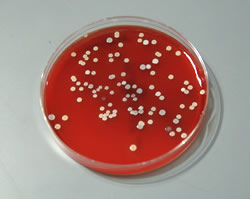Last updated: July 31, 2012
NIH team describes protective role of skin microbiota
Media Availability
NIH team describes protective role of skin microbiota
Commensal bacteria and immune cells work together to fight harmful microbes
Bethesda, Md., Thurs., July 26, 2012 — A research team at the National Institutes of Health has found that bacteria that normally live in the skin may help protect the body from infection. As the largest organ of the body, the skin represents a major site of interaction with microbes in the environment.
Although immune cells in the skin protect against harmful organisms, until now, it has not been known if the millions of naturally occurring commensal bacteria in the skin — collectively known as the skin microbiota — also have a beneficial role. Using mouse models, the NIH team observed that commensals contribute to protective immunity by interacting with the immune cells in the skin. Their findings appear online on July 26th in Science.
The investigators colonized germ-free mice (mice bred with no naturally occurring microbes in the gut or skin) with the human skin commensal Staphylococcus epidermidis. The team observed that colonizing the mice with this one species of good bacteria enabled an immune cell in the mouse skin to produce a cell-signaling molecule needed to protect against harmful microbes. The researchers subsequently infected both colonized and non-colonized germ-free mice with a parasite. Mice that were not colonized with the bacteria did not mount an effective immune response to the parasite; mice that were colonized did.
In separate experiments, the team sought to determine if the presence or absence of commensals in the gut played a role in skin immunity. They observed that adding or eliminating beneficial bacteria in the gut did not affect the immune response at the skin. These findings indicate that microbiota found in different tissues — skin, gut, lung — have unique roles at each site and that maintaining good health requires the presence of several different sets of commensal communities.
This study provides new insights into the protective role of skin commensals, and demonstrates that skin health relies on the interaction of commensals and immune cells. Further research is needed, say the authors, to determine whether skin disorders such as eczema and psoriasis may be caused or exacerbated by an imbalance of skin commensals and potentially harmful microbes that influence the skin and its immune cells.
The study was led by investigators in the laboratories of Yasmine Belkaid, Ph.D., at the National Institute of Allergy and Infectious Diseases, in collaboration with Julie Segre, Ph.D., at the National Human Genome Research Institute, and Giorgio Trinchieri, M.D., and Heidi Kong, M.D., at the National Cancer Institute. All three Institutes are NIH components.
Article:
S. Naik et al. Compartmentalized control of skin immunity by resident commensals. Science, 2012. [Full Text]
Who:
Yasmine Belkaid, Ph.D., chief, Mucosal Immunology Section, Laboratory of Parasitic Diseases, National Institute of Allergy and Infectious Diseases, and Julie Segre, Ph.D., senior investigator, Genetics and Molecular Biology Branch, National Human Genome Research Institute, are available for comment.
Contact:
To schedule interviews, please contact Julie Wu, (301) 402-1663, niaidnews@niaid.nih.gov, or Raymond MacDougall, (301) 402-0911, macdougallr@mail.nih.gov.
NIAID conducts and supports research-at NIH, throughout the United States, and worldwide-to study the causes of infectious and immune-mediated diseases, and to develop better means of preventing, diagnosing and treating these illnesses. News releases, fact sheets and other NIAID-related materials are available on the NIAID Web site at www.niaid.nih.gov.
NHGRI is one of the 27 institutes and centers at the National Institutes of Health, an agency of the Department of Health and Human Services. The NHGRI Division of Intramural Research develops and implements technology to understand, diagnose and treat genomic and genetic diseases. Additional information about NHGRI can be found at its website, www.genome.gov.
NCI leads the National Cancer Program and the NIH effort to dramatically reduce the burden of cancer and improve the lives of cancer patients and their families, through research into prevention and cancer biology, the development of new interventions, and the training and mentoring of new researchers. For more information about cancer, please visit the NCI website at www.cancer.gov or call NCI's Cancer Information Service at 1-800-4-CANCER (1-800-422-6237).
About the National Institutes of Health (NIH): NIH, the nation's medical research agency, includes 27 Institutes and Centers and is a component of the U.S. Department of Health and Human Services. NIH is the primary federal agency conducting and supporting basic, clinical, and translational medical research, and is investigating the causes, treatments, and cures for both common and rare diseases. For more information about NIH and its programs, visit www.nih.gov.

